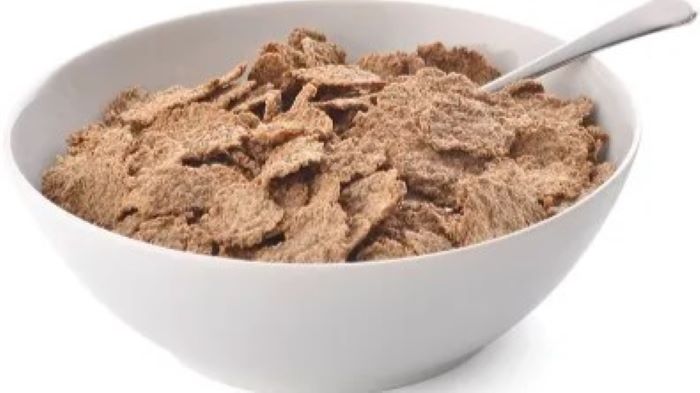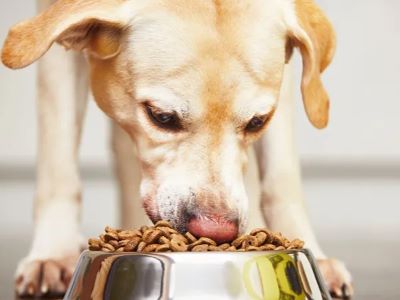Bran flaxes is a healthy whole wheat breakfast and the most preferable too. It is easy to make and serves health benefits too. It is the one-stop solution for your unexpected hunger cravings. For humans, it is the perfect morning breakfast and last-minute saviour but, “Can dogs eat bran flakes?”
Through our blog we will try to provide you with all the required information, so your dog can enjoy another yummy and tasty meal.

What Are Bran Flakes?
Bran flakes are a cereal breakfast which is made up of whole wheat and wheat kernels. These wheat kernels are called bran, thus the name bran flakes make sense. Bran flakes are one of the most favourable breakfasts for people and are quite helpful too.
Bran flaxes are popular among people as it is easy and quick to make and is even suitable for our tastebuds. They are rich in fibre[1] and contain various vitamins and minerals which makes them a healthier alternative itself.
Bran flakes help in the digestion process and maintain gut health. It also helps to keep cholesterol in check. They prefer to consume more with milk, you can also add additional ingredients like fruits, nuts or yoghurt in it to make it tastier.
Can Dogs Eat Bran Flakes?

Yes, dogs can eat bran flakes and they are absolutely safe for them to consume. While feeding your dog bran flaskes always remember to feed the plain and unsweetened ones. Bran flakes being rich in vitamins, and minerals also contain protein and iron which is beneficial for their growth.
Though bran flakes are packed with some nutrients they should not replace your dog’s daily food. Bran flakes should be given to dogs as a treat and in moderate quantity. While feeding your dog bran flakes keep the general rule in mind, the treat should not surpass 10% of your dog’s daily calorie requirement.
Avoid feeding your dog bran flakes along with milk, raisins, sugar and artificial sweeteners. If you want you can add fruits and suitable nuts to your dog’s bran flakes.
Benefits of Bran Flakes for Dogs
Here are the benefits of bran flakes for dogs:
- Bran flakes help improve a dog’s digestion and bowel movement.
- By adding bulk and moisture to a dog’s stool it helps in providing them relief from constipation and diarrhoea.
- It binds the bile acid and stops them from reabsorbing into the bloodstream which lowers their blood pressure and cholesterol.
- It makes your dog feel full, which reduces their appetite. Due to reduced appetite dogs tend to eat less and it helps in controlling their weight.
- It improves a dog’s insulin sensitivity lowering the risk of diabetes and helps to stabilise the blood sugar level.
- The antioxidants and minerals present in it help to strengthen a dog’s immune system and help fight various infections.
- It provides a boost to the dog’s energy level by providing the complex carbohydrates that digest and mix with the bloodstream.
As mentioned in by Tiffany Tupler, DVM, CBCC-KA in petmd, "Fiber, a form of carbohydrate, is very important for a dog’s normal gastrointestinal function and health. It keeps the colon healthy along with the microbes of the gut. The measure of fiber is reported as crude fiber (the insoluble portions). Total dietary fiber is composed of both soluble and insoluble fibers."
Risks of Bran Flakes for Dogs

Here are the risks of feeding bran flakes to your dog:
- Bran flakes are rich in fibre. High fibre content increases the water intake in dogs, which leads to frequent urination. This decreases the water level in the dog’s body and leads to dehydration in them.
- Excess consumption of bran flakes can upset a dog’s stomach. The fibre in it gets fermented by the gut bacteria of the dog and produces gas. This leads to excessive gas and bloating in dogs.
- Bran flakes interfere with a dog’s digestive tract causing a reduction in the absorption of nutrients. This leads to nutrient deficiency in dogs and hampers their growth.
- The calorie content in bran flakes is high. If consumed in more than the required quantity it can lead to obesity in dogs.
- Due to gluten present in bran flakes, some dogs might develop allergic reactions to it.
Other High-Fiber Foods for Dogs
Here are some other high-fiber foods for dogs:

Oats:
Oats contain soluble fibres which are good for dogs to consume. It helps to manage and control blood sugar levels and cholesterol in dogs. It contains fibre called beta-glucan which helps to boost the dog’s immunity and fight against inflammation.
Brown rice:
Brown rice consists of both soluble and insoluble fibre. It is a whole-grain food which helps to improve a dog’s digestion and prevents obesity. You can feed your dog boiled brown rice along with curd.
Carrots:
Carrots are rich in fibre, beta-carotene and vitamin A. It makes really good crunchy and healthy treats for dogs. It helps to improve the dog’s vision and maintain coat health.
Apples:
Apples are full of fibre and vitamin C. The apples help deal with the dog’s dental health, improve digestion and strengthen immunity. Apple helps reduce inflammation and oxidative stress in dogs.
FAQs
Can dogs eat bran flakes?
Yes, bran flakes are OK for dogs to eat, but only in small quantities and without any added milk, sugar, or raisins. Bran flakes are rich in fibre and beneficial for your dog’s heart, digestion, and vitality. They are, however, high in calories, so dogs with sensitive stomachs or dehydration problems can find them inappropriate. Bran flakes are a good treat or supplement, but they shouldn’t take the place of your dog’s usual meal.
How much bran flakes can I give my dog?
A spoonful of bran flakes for every 20 pounds of body weight is the suggested serving size for dogs. But, based on your dog’s age, size, exercise level, and overall health, this might change. Bran flakes shouldn’t be fed to your dog in place of their regular meal, instead, they should be provided as an occasional treat or supplement.
Will bran flakes firm up my dog’s stool?
Due to their high fibre content and ability to absorb extra moisture in the digestive system, bran flakes can assist your dog’s stool to become more solid. But you should only feed your dog bran flakes with caution without any extra milk, sugar, or raisins.
Can I give my dog bran flakes every day?
No, bran flakes shouldn’t be given to your dog on a daily basis. Due to its high calorie and fibre content, bran flakes can lead to weight gain or digestive problems if consumed in excess or too frequently. Bran flakes shouldn’t be fed to your dog in place of their regular meal, instead, they should be provided as an occasional treat or supplement.
Can dogs eat human bran flakes?
Yes, dogs can eat human bran flakes, but only in small quantities and without any additional sugar, milk, or raisins. High in fibre, human bran flakes can benefit your dog’s heart, digestion, and energy levels. They may not be suitable for dogs with sensitive stomachs or dehydration problems, though, because they are also high in calories.
Conclusion
Like humans dogs too need a variety of food, eating the same dog food regularly can bore your dog. We hope that after reading our blog, “Can dogs eat bran flakes?” you have a healthy and safe variety to enhance your dog’s taste.
Bran flakes are one such food that you and your fur baby can consume together. So now you no longer have to worry about that sweet blackmailing and puppy eyes.
Reference:
- Dacvim, C. R. H. V. M. (2022b, March 16). Fiber frustrations. Clinical Nutrition Service at Cummings School.



